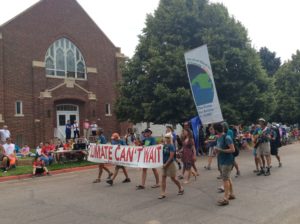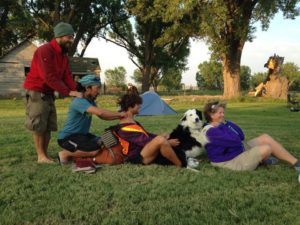Dear Friends,
Five years ago this week, the Great March for Climate Action enjoyed a day off in Culbertson, Nebraska. This excerpt from my book, Marcher, Walker, Pilgrim, explains the importance of remembering our “interdependence” even as we celebrate our “independence.”
Culbertson, a town of 600, swells to several thousand people for its annual Independence Day celebration. We’re thrilled to have been invited to join the parade. Some of us play instruments and sing while others carry signs and a banner. Folks along the parade route seem genuinely receptive, or at least politely amused, and we connect with our biggest audience since Los Angeles.
After the parade, I immerse myself in Culbertson’s holiday fun. I watch the horseshoe competition for a bit, then stumble on a luncheon to raise funds for the new library. I drop $10 for a modest meal and grab a seat at one of the tables, striking up a conversation with a woman who introduces herself as Corky Krizek. She and her family live in McCook and they saw us in the parade. Corky’s got the usual questions about shoes and weather, then asks “Have you lost much weight?”
“Yeah, dropping 24 pounds in the first two months was one of the biggest surprises,” I tell her. “I rip through calories like a twister through a cornfield, and I’m craving meat like there’s only one pig and one cow left on the entire planet.”
“Well, when you get to McCook tomorrow, you’ll be only a few blocks from our place. Stop by and I’ll make you a big steak dinner.”
I thank Corky, then wander around for another couple hours, reveling in the nostalgia of all that’s good and wholesome about America: family, food, fun, and a robust love of land and country. I think about the myriad ways in which everyone here, each of these several thousand people, need each other, how their lives are woven together in so many essential ways. July 4 is not so much a celebration of America’s independence as it is Americans’ interdependence.
Perhaps that little girl in the red dress over there, the one darting around the playground with her friends, will only overcome her learning disability with the after-school reading program at the new library.
Perhaps that old farmer I saw tossing ringer after ringer at the horse-shoe contest had an accident last fall and was only able to get his crops in with the help of his neighbors.
Perhaps the Climate March wouldn’t have even made it out of California without the kindness and support of hundreds of people. Yeah, I’m certain of that.
Sure, Americans should celebrate winning our independence from England, even though things probably would have turned out about the same whether we’d fought a war or followed the more diplomatic path of our Canadian neighbors. Sure, we should celebrate the fact that, over the course of 238 years, no foreign power has come close to invading our country and subjugating our people.
But meanwhile, we’ve bought the notion that independence means being able to do whatever we want, whenever we want, without anybody’s help. The percentage of Americans who now live by themselves has swelled from five percent in the 1920s to 27 percent today. That’s not independence. That’s isolation. That’s the face of loneliness — and though it may be hard to measure, those who study these sorts of things claim loneliness has increased dramatically over the past twenty years.
On July 4, we celebrate our independence from foreign powers. The rest of the year, we celebrate our independence from each other. Meanwhile, we’ve failed to notice that America has succumbed to a gradual invasion, a more insidious subjugation. Through the clever manipulation of laws by greedy men (yeah, again, they’re mostly men) and our own complacency, national chains and big corporations now dominate our economy. It’s increasingly difficult, almost impossible in some professions, for hard-working men and women to harness their talent, energy, and passion to realize the American dream and earn a living as a farmer, business owner, or entrepreneur not beholden to some distant corporate overlord.
While we cheer the parade vehicles made in Japan, wave our tiny flags made in China, and catch little pieces of candy made in Mexico, the wealthy and powerful quietly consolidate their control over our lives. They do this in large part through buying off America’s political leadership, both Democratic and Republican, and solidifying their control of our lives through manipulative advertising. We fail to notice that this unholy alliance of corporate and governmental power has eviscerated anti-trust laws, gutted protections against the formation of monopolies, allowed foreign corporations to buy our farmland, and enacted trade treaties that ship our jobs and factories overseas. When the powerful interests that benefit from these laws run aground because of their own greed and stupidity, our politicians simply provide taxpayer-financed bailouts to banks, car manufacturers, and other industry giants deemed “too big to fail.”
The way out of this loss of independence is through recognizing, celebrating, and building upon our essential interdependence. Buying our food from farmers we know and trust. Supporting businesses owned by people who live and work in our town. Using cash instead of credit cards, since the small business owner in the middle gets dinged badly by the credit card company. Doing more with barter.
The long road that led us from America’s former independence to our current dependence — and the difficult path out of dependence through interdependence — is our only hope if we are to win both the race against climate change and the struggle to regain our democracy.


